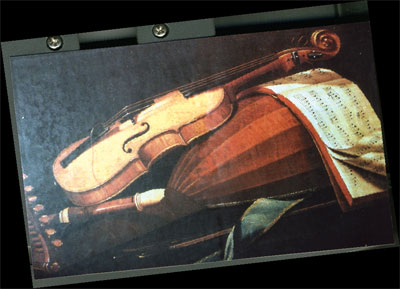Where were you hiding, genius?
 All these years; from the day I dropped the lid on the keyboard and
stacked away my books. I knew all the Masters then, especially the ones
who figured in my examinations. I still remember them all and decades
later, when I muse through their volumes .... volumes of classical
music, researching them, even the lesser known ones when I began putting
into print all those classics, flying across the seas to not to miss the
London Philharmonic Orchestra once too often, on two occasions to watch
the New York Symphony Orchestra but never discovered you. All these years; from the day I dropped the lid on the keyboard and
stacked away my books. I knew all the Masters then, especially the ones
who figured in my examinations. I still remember them all and decades
later, when I muse through their volumes .... volumes of classical
music, researching them, even the lesser known ones when I began putting
into print all those classics, flying across the seas to not to miss the
London Philharmonic Orchestra once too often, on two occasions to watch
the New York Symphony Orchestra but never discovered you.
Why were you gathering dust all these years when you were going to
crack my heart with your fabulous CANON in D.
Why on earth had the score to be called. CANON instead of Ascention
when all the time you wrote sacred music the world appear to have
forgotten or not known. Then, suddenly I heard this wondrous score that
I had never heard before, simply heavenly and out of this world. I
played it over and over again like experiencing a physical ascension of
our Lord.
Its’ composer, Johann Pachelbel I discovered.
Very often when one it gripped by the intensity of a score that
dazzles the mind, various shadows or visions rise from such compositions
because of their inspirational effect felt. I always visualised Rudlf
Nureyev rising off the score of Tchaikovsky's Swan Lake suite. Those
impacts can be that of the boy next door, a solider who laid down his
life, a child or a parent who is no more. Music can play upon their
memories. I have felt the presence of my music teacher, Glenice Range
whose tender, caring beautiful nature has had such influence when I was
her student and now I always associate her with the haunting music of
Schubert. And presently, my discovery of Pachelbel's CANON in D, it
brought into focus its brilliant symphony magically involving a radiant
spiritual leader with a resounding knowledge of classical repertoire
whose presence I feel each time this score is played.
|

The immaculate score CANON in D on strings lay hidden and
sparsely discovered, it gives the ‘feel’ of the ASCENSION of
Jesus Christ to all of us whose faith is stirred by its impact.
Composer is Johanne Pachelbel from the Baroque era. |
The ‘feel’ of ascension
‘All Christians are passionate about the ascension of our Lord that
marks the greatest day in our lives. His sacrifice, coming into the
world to take upon Himself our sins and pay the final sacrifice to
redeem us all. No one reveals its truth better than the Holy Bible and
we are vaguely aware of its visionary reveal but what I discovered in
CANON is the ‘feel’ of the Lord's ascension in a twelve minute saga
rising to take His seat on the right hand of His Father, whence He shall
come to judge both the quick and the dead.’ The composer takes us on
this wondrous spectacular journey, rising, rising and rising above His
creation. The fugue is in its robust form of polyphonic or contrapuntal
composition and contain an orderly score treated with one or more themes
and set for three parts which I amount The Father, Son and Holy Ghost.
The underlying principle can be the Holy Trinity in that all parts
are equal. This is only my theory on CANON and can be right or wrong.
Yet, when I keep listening to its haunting melody, all I can see in the
spirit of Ascension, the rise of the Lord and its ‘feel'.
A spiritual journey in music is beyond normal bounds of calling and
to imagine that of all people I can be swept off my feet by a composer
of BAROQUE era (1600-1750) with such a stunning score. I went over the
rails in my emotive nature and at times, near brink of tears.
Who is Johanne Pachelbel?
Never heard of him until a fortnight ago and all the while he was
lying in my collection. Born in Germany, (1653-1706), his principle
claim to fame during his lifetime was as an organist and composer who
wrote many chorales for the organ. But he wrote profusely sacred scores
that included ninety five Fugues as interludes to the Magnificate as
well as non-liturgical toccatas, preludes, keyboard suites and many
similar pieces. One cannot list his motets because it is so long.
He was privileged to tutor Johanne Christoph Bach who later tutored
Johann Sebastian because he was a close friend of the Bach family. His
greatest act was to pioneer musical symbolism by using such devices in
his sacred music as repeated notes to illustrate (this is evident in
CANON) steadfastness; minor keys for sorrow, major keys for joy and
portrayed evil on a broken diminished seventh chord.
The sad part of his genius is that he never discovered himself nor
his genius in music. Had he done it, he would have been in par with the
worlds greatest ones. His only contemporary I was able to trace, was the
Italian Arcangelo Correlli who was noted for the popular CONCERTO
(grosso) Op. 6, No. 8
Had the composer titled Ascension instead of CANON in D, Pachelbel
would have superseded Handel's Messiah as the ‘rising’ Christ.
|



